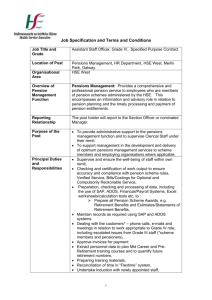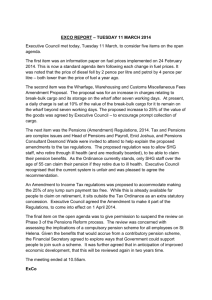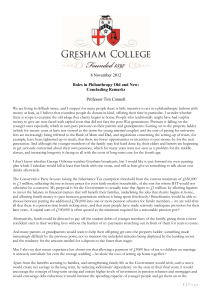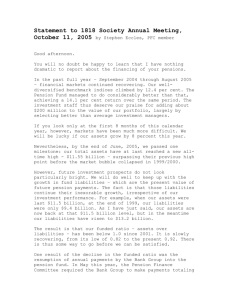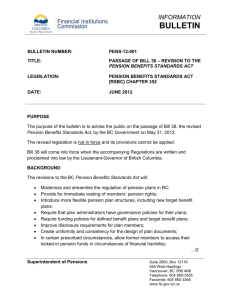Government Spending Cuts
advertisement
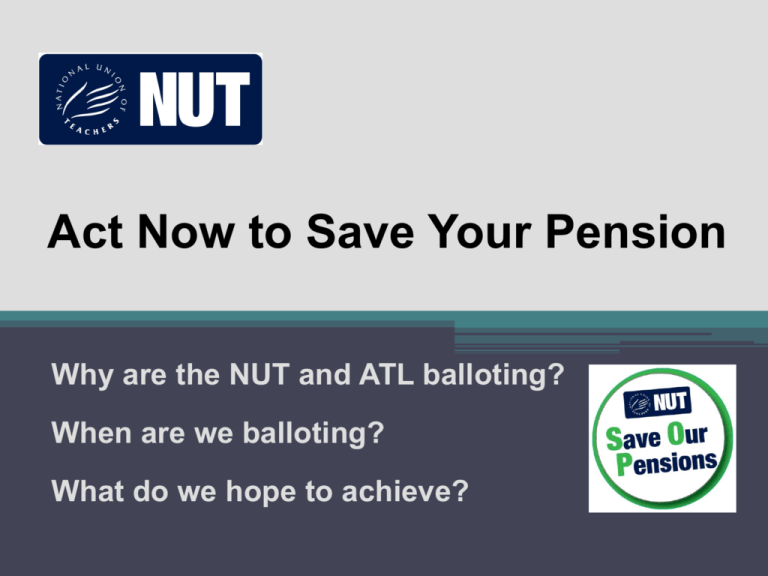
Act Now to Save Your Pension Why are the NUT and ATL balloting? When are we balloting? What do we hope to achieve? Who pays for the crisis? "The price of this financial crisis is being borne by people who absolutely did not cause it.” Mervyn King (Governor of Bank Of England) Pay More • The government wants to put up your contributions from 6.4% to 9.8% of salary – an increase of more than 50 % • So, in addition to a pay freeze for two years, an NQT will pay an extra £60 a month and a teacher on UPS3 more than £100 a month. Work Longer • The Government is planning to tie the “normal pension age” – the age at which you can take your teachers’ pension in full - to the State Pension Age (SPA). • A quick look at the plans for the SPA show that teachers who are: ▫ 57 to 45 will have an NPA of 66 ▫ 44 to 34 will have an NPA of 67 ▫ 33 and under will have an NPA of 68 • Any retirement before these ages will be based on a reduced pension. Get Less (Part 1) • The Government is also thinking about changing public sector pensions from a ‘final salary’ to a ‘career average’ system. • That would base your pension on your average pay across your whole career. • ‘Career average’ pensions can sometimes be fairer, but it depends on how they are implemented. • The NUT believes the Government will use career average as another way of cutting spending on pensions. Get Less (Part 2) • From April 2011, pensions will now be increased annually by the Consumer Prices Index (CPI) rather than the Retail Prices Index (RPI). • This change will affect existing and future pensioners alike and will cost you about 15 per cent of your total income during retirement. • A teacher retiring on a £10,000 pension would lose over £35,000 over the course of a 25 year retirement - in addition to any losses already suffered as a result of retiring at 60. • This is despite both governing parties promising no changes to accrued pension rights in their manifestos. What is the effect of a reduced pension? • An example: if you are 50 now, your normal pension age would be likely to rise to 66. • Assuming you’re on UPS3 and you still retire at 60, you would lose £1,300 per year from your pension and £4,000 from your lump sum, due to the actuarial reduction applied to that part of the pension you would build up between 50 and 60. How can I find out what I would lose? To find out: • how much the contributions rise would cost you now; • how much longer you would have to work for a full pension; • how much you might lose over the course of your retirement. Go to the NUT’s pension loss calculator at www.teachers.org.uk/pensions Why are we being balloted? • Pensions are deferred pay, so you are effectively being asked to take a pay cut. • In 2005 and 2006, we saw off threats to our pensions by standing together and being prepared to take action. • If you want a future with a decent and affordable pension then you have to be ready to do so again. • Now is the time to take action. We want to change the government’s mind before it imposes these unnecessary and unfair changes to our pensions. Why is this the right time to ballot? • The NUT is fully involved in talks with the government but so far the government hasn’t backed down on any of its proposals. • We believe the government is not taking these talks seriously at all. • There has been no valuation of the Teachers’ Pension Scheme, required by law, which would demonstrate the actual costs of our pensions. Why is this the right time to ballot? • The only thing the government want to talk about is how to distribute the increase between different public sector workers – this could result in a further increase in the amount teachers have to pay. • The government wants to finalise their proposals to increase our contributions by the end of June. • We will continue to talk to the government, but we are balloting to take action to help us get a fair deal for teachers. • If we wait until next term it means no action could be taken before October – by which time the government will have put many of these changes into law. Will a strike ballot have any effect? • The NUT and ATL firmly believe it will. We’ve made your case to government and it’s a very strong case. • It is important that the government now sees the strength of feeling amongst teachers on the issue. • The NUT and ATL want to change the government’s mind before the negotiations finish in June • The NAHT have now agreed to ballot members for strike action What would the government have to do for the NUT to call off strike action? • withdraw its unfair proposals to increase contributions; • withdraw the RPI/CPI switch; • carry out the valuation of the Teachers’ Pension Scheme (which is now a year overdue) on the same basis as it has been carried out previously; • follow the 2006 agreement in discussing and deciding what changes if any are needed. Is it appropriate to ballot for strike action while still negotiating? • Yes it is. • To wait until negotiations have failed would be too late. • By showing the strength of feeling among teachers, a successful ballot will help our negotiators enormously. What happens if the negotiations are successful? • If we can reach an agreement, then the NUT will call off any strike action. But we don’t think there is any chance of them being successful without the threat of industrial action. Are teachers’ pensions too expensive? • The NUT’s agreement with the Government in 2006 made changes to the Teachers’ Pension Scheme that made it sustainable for the long term. • The National Audit Office has confirmed that the cost of public sector pension schemes will fall as planned. • This agreement made provision for teachers to pay more for their pensions, or for other changes to be made if the valuation requires it. • This shows the willingness of teachers to accept their share of any increasing costs – but the government wants to abandon that agreement and impose changes without any informed basis. Are teachers’ pensions “goldplated”? • The average pension in payment from the Teachers’ Pension Scheme is just £10,000 a year. Only 5 per cent of pensions are for £20,000 or more. • Your pension is your recompense for a lifetime in teaching. • In a recent survey over 90% of teachers who responded agreed that the TPS is fair and affordable. • The decision to attack your pension is political not economic. The real pensions problem • Two-thirds of private sector employees are not in any employer-backed pension scheme • 87% of private sector final salary pension schemes are closed to new members • Cutting public sector pensions won’t help private sector workers in retirement - we need decent pensions for all! Organising for the ballot • Ballot starts on Tuesday May 17th • Ballot closes on Tuesday June 14th • Call a meeting in school to discuss this • Use social media to “create a mood” • Follow the NUT on Twitter @NUTonline We marched together, now we must strike together


